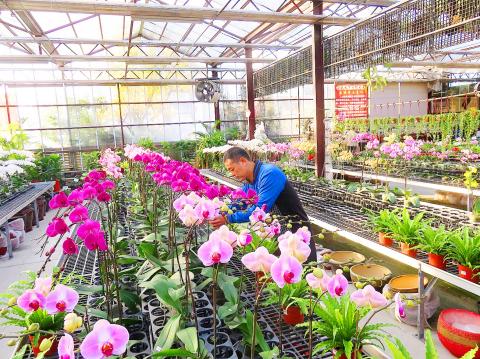Flower farmer Lin Chiang-kai (林將凱), the owner of a major moth orchid greenhouse, said he aspires to raise the international profile of Taiwanese floriculture at next year’s Taichung World Flora Exposition.
Although he had no formal agricultural training, Lin said his orchid-growing hobby blossomed into a side job that eventually overtook his career as a car salesman.
Retiring from selling cars, Lin built a 1 hectare flower greenhouse with nearly 100,000 plants in Taichung’s Houli District (后里) to pursue flower farming, which he dreamed of as a boy, he said.

Photo courtesy of Taichung Agriculture Bureau
The greenhouse incorporates orchid-growing technologies and techniques imported from the Netherlands, and has played a major role in the creation of at least 60 to 70 unique moth orchid breeds, Lin said.
He chose to rent land for his greenhouse in Houli, because its climate is ideal for floriculture, Lin said, adding that a winter temperature of 18°C is ideal for inducing flowering in plants.
The greenhouse is comanaged by his wife, he said.
The techniques and technologies that he imported from the Netherlands are crucial for maintaining the quality of his orchids, he added.
As orchid bulbs need to grow in hot climes, he contracts floriculturists in southern Taiwan to mature the plants before shipping them to his greenhouse in Houli, where they are farmed until ready to flower, Lin said.
“Each flowering moth orchid plant takes two years of farming before it can be delivered to a customer. This is a significant investment in labor, time and capital on the part of flower farmers that I can scarcely describe,” Lin said.
He has planted almost every species in the orchid family, from dancing ladies and Venus slippers to moth orchids, Lin said, but added that he has lately focused on large-scale farming of moth orchids, because they are a perennial favorite with consumers.
Taiwan used to be a leading global grower of moth orchids and the Taichung flower expo is a good venue to put the international spotlight back on the nation, he said, adding that the expo would be good for tourism in Houli.

WANG RELEASED: A police investigation showed that an organized crime group allegedly taught their clients how to pretend to be sick during medical exams Actor Darren Wang (王大陸) and 11 others were released on bail yesterday, after being questioned for allegedly dodging compulsory military service or forging documents to help others avoid serving. Wang, 33, was catapulted into stardom for his role in the coming-of-age film Our Times (我的少女時代). Lately, he has been focusing on developing his entertainment career in China. The New Taipei District Prosecutors’ Office last month began investigating an organized crime group that is allegedly helping men dodge compulsory military service using falsified documents. Police in New Taipei City Yonghe Precinct at the end of last month arrested the main suspect,

A cat named Mikan (蜜柑) has brought in revenue of more than NT$10 million (US$305,390) for the Kaohsiung MRT last year. Mikan, born on April 4, 2020, was a stray cat before being adopted by personnel of Kaohsiung MRT’s Ciaotou Sugar Refinery Station. Mikan was named after a Japanese term for mandarin orange due to his color and because he looks like an orange when curled up. He was named “station master” of Ciaotou Sugar Refinery Station in September 2020, and has since become famous. With Kaohsiung MRT’s branding, along with the release of a set of cultural and creative products, station master Mikan

RISING TOURISM: A survey showed that tourist visits increased by 35 percent last year, while newly created attractions contributed almost half of the growth Changhua County’s Lukang Old Street (鹿港老街) and its surrounding historical area clinched first place among Taiwan’s most successful tourist attractions last year, while no location in eastern Taiwan achieved a spot in the top 20 list, the Tourism Administration said. The listing was created by the Tourism Administration’s Forward-looking Tourism Policy Research office. Last year, the Lukang Old Street and its surrounding area had 17.3 million visitors, more than the 16 million visitors for the Wenhua Road Night Market (文化路夜市) in Chiayi City and 14.5 million visitors at Tainan’s Anping (安平) historical area, it said. The Taipei 101 skyscraper and its environs —

Taiwan on Friday said a New Zealand hamburger restaurant has apologized for a racist remark to a Taiwanese customer after reports that it had first apologized to China sparked outrage in Taiwan. An image posted on Threads by a Taiwanese who ate at Fergburger in Queenstown showed that their receipt dated Sunday last week included the words “Ching Chang,” a racial slur. The Chinese Consulate-General in Christchurch in a statement on Thursday said it had received and accepted an apology from the restaurant over the incident. The comment triggered an online furor among Taiwanese who saw it as an insult to the